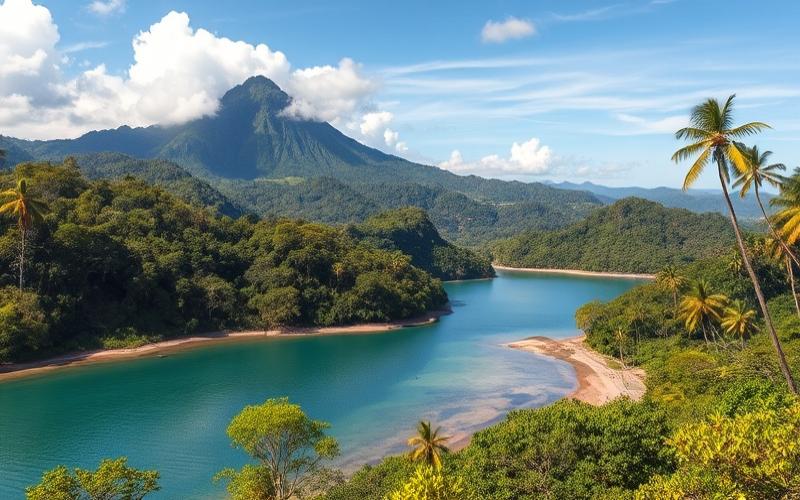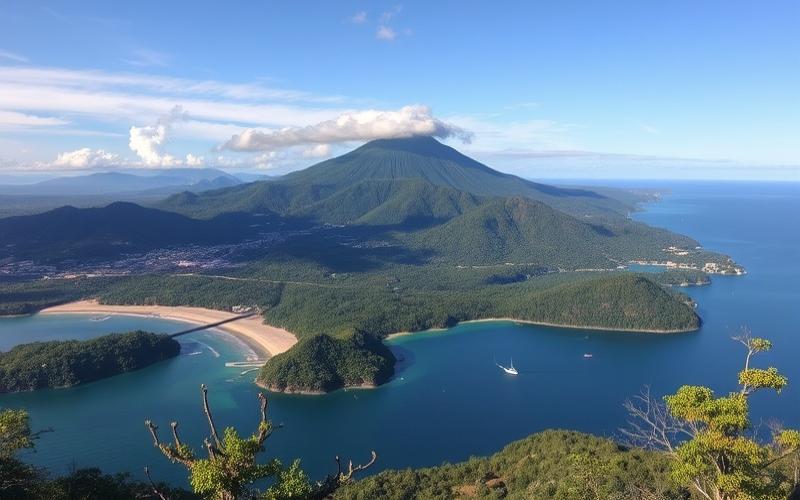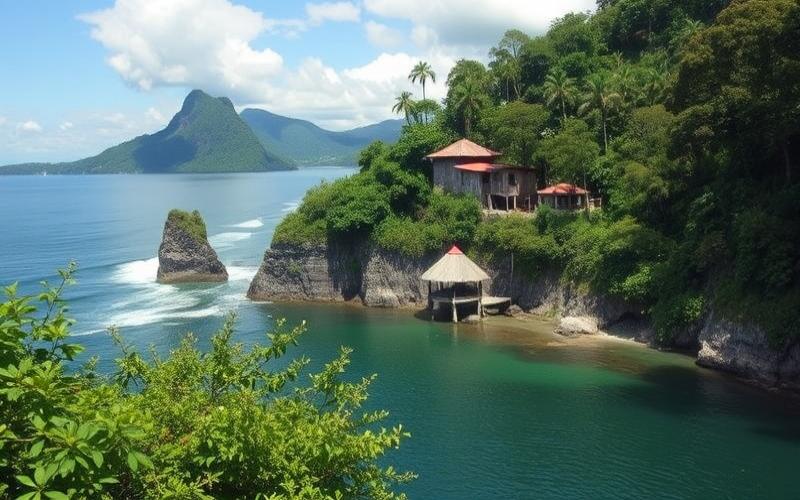
 Published on and written by Cyril Jarnias
Published on and written by Cyril Jarnias
Purchasing or Transferring Real Estate in Costa Rica
Purchasing or transferring real estate in Costa Rica requires a thorough understanding of current laws, making real estate succession a highly complex subject. Thanks to its stable and transparent legal framework, the country has established itself as a prime destination for international investors.
However, navigating the specifics of the complete procedure, including inheritance transfer methods, tax obligations, and notarial requirements, proves essential to avoid potential pitfalls.
Whether you’re a potential heir or an investor seeking opportunities, this article will guide you through the key steps of the succession process in Costa Rica, ensuring a smooth transition compliant with local regulations.
Good to Know:
Costa Rica offers a stable legal framework for foreign investors, but it’s crucial to understand local specifics regarding real estate succession.
Laws and Regulations Governing Real Estate Succession in Costa Rica
The transfer of real estate located in Costa Rica is exclusively governed by Costa Rican law, regardless of the nationality of the deceased or their heirs.
The succession system is mandatory (no complete freedom in designating heirs) and formalistic (strict requirements regarding required forms).
Applicable texts primarily come from the Costa Rican Civil Code as well as specific laws on donations and wills.
Procedure for Transferring Real Estate to Heirs
- Opening of the succession:
- Upon presentation of the death certificate, a public notary or attorney officially opens the procedure.
- Determination of heirs:
- If a will exists, it must be presented; otherwise, the legal order applies.
- Probate:
- With a Costa Rican will: simplified procedure before a public notary possible if no disputes exist between heirs.
- Without a will or in case of dispute: mandatory judicial procedure before civil court.
- Effective transfer:
- Drafting of an authentic deed by the notary documenting the transfer to designated beneficiaries.
- Registration:
- The deed is registered with the National Registry for the new owners to be legally recognized.
Respective Roles of Notaries and Attorneys
| Professional | Main Role |
| Notary | Drafting/validation of will; opening/management of notarial probate; drafting/recording official succession transfer deeds |
| Attorney | Legal advice on estate planning; assistance during contentious or complex successions |
Legal Requirements Regarding Wills
- Will must be drafted with assistance from a local public notary or registered attorney
- Signature required in presence of notary and witnesses
- Mandatory registration with National Registry for validity against third parties
Probate
Required in all cases except for previously executed donations
Can be conducted before public notary if no disputes exist between beneficiaries
Rights/Taxes on Real Estate Succession
Costa Rica does not levy direct inheritance tax.
However, certain administrative fees exist:
- Fixed fees related to property registration
- Professional fees (notaries/attorneys)
- Potential fees during cadastral transfer
These amounts remain significantly lower than those applied in some European countries.
Special Cases: Foreigners Inheriting in Costa Rica
- No legal obstacles: a foreigner can freely inherit property located in Costa Rica
- Same formal regime as for any local citizen
- Recommended: have will drafted locally in Spanish according to local forms
Practical Tips
Quickly consult a specialized attorney upon acquiring real estate to organize your succession according to your wishes
Prepare a will compliant with Costa Rican law as soon as possible
- Include updated supporting documents for each beneficiary (passport copies)
- Systematically register your document with the National Registry
Practical Checklist:
- Anticipate all succession procedures before death
- Regularly update personal file with land registry
- Verify no debts are attached to property before official opening
- Scrupulously respect procedural deadlines imposed by local Civil Code
Following these steps guarantees an efficient and legally secure transition in compliance with local laws.
Good to Know:
In Costa Rica, real estate succession is governed by the Civil Code and laws on successions and donations, often requiring intervention from a notary and attorney to guarantee legal compliance of property transfers. While optional, a will facilitates this process by clarifying the deceased’s wishes, but probate may be necessary to validate the will. Inheritance taxes, determined by property value and heirs’ relationship to the deceased, must be settled with Costa Rican tax authorities. Foreigners can inherit properties in Costa Rica but must follow the same formalities as citizens, while ensuring consultation with a local legal expert to navigate legal particularities. To facilitate transition, it’s advisable to anticipate these procedures by compiling a file including required deeds, appraisals, and identification documents, and to respect legal deadlines to avoid delays and penalties.
The Essential Role of the Notary in International Succession
The notary, within the framework of cross-border succession involving real estate in Costa Rica, mobilizes specific legal expertise in private international law, comparative succession law, and management of cross-border formalities.
Specific Notary Competencies in International Law:
- Mastery of private international law principles to determine applicable succession law.
- Ability to analyze and interpret conflict of law rules between Costa Rica and the deceased’s country of origin.
- Experience in drafting and certifying internationally recognized notarial acts (apostilles, legalizations, authentic powers of attorney).
- Advice on drafting wills valid and effective in multiple jurisdictions.
Notary’s Role in Complying with Costa Rican and Foreign Succession Laws:
- Verification of foreign will validity regarding Costa Rican law, knowing that a will drafted abroad doesn’t necessarily cover assets located in Costa Rica.
- Application of Costa Rican succession procedure, which often differs from the home country’s regime (for example, absence of forced heirship in Costa Rica).
- Handling local administrative procedures: succession filing, inventory, debt payment, real estate property transfer.
- Declaration of assets to home country tax authorities when required (particularly for heirs domiciled in France).
Coordination with Other Professionals:
- Working in consultation with attorneys specialized in international succession law to ensure procedural compliance and optimize international taxation.
- Collaboration with local experts (Costa Rican attorneys, tax specialists, sworn translators) for document acquisition, expert assessments, or dispute management.
- Regular communication with heirs and representatives in different countries.
Obstacles the Notary Helps Overcome:
| Potential Obstacles | Solutions Provided by Notary |
|---|---|
| Legal discrepancies (will validity, applicable laws) | Comparative analysis of legislation and securing of acts |
| Differences in administrative procedures | Handling dossier preparation and local procedures |
| Language and cultural barriers | Explanation of local customs, use of official translations |
| Cross-border tax risks | Advice on declaration and taxation in each country |
| Delays or disputes | Document preparation to reduce conflicts and accelerate processes |
Importance of International Notarial Expertise:
- Ensures act compliance with Costa Rican and home country requirements.
- Facilitates recognition of succession decisions abroad.
- Guarantees legal security for heirs and speed of asset transfer.
- Prevents conflicts through anticipation of difficulties and multidisciplinary coordination.
Key Takeaway
The intervention of a notary with solid international law expertise is essential to secure and accelerate management of succession involving real estate in Costa Rica, while ensuring compliance with each concerned country’s legislation.
Good to Know:
In the context of succession involving real estate in Costa Rica, the notary’s role is crucial for navigating international law complexities. Expert in local and foreign succession legislation, the notary guarantees compliance with Costa Rican laws and those of the deceased’s country of origin. In collaboration with attorneys specialized in international succession law, they coordinate management of legal procedures to avoid disputes. The notary helps overcome obstacles related to cultural and legal differences by providing expertise for smooth transition. For example, during property transfer, they can clarify similarities and differences between applicable legal regimes, ensuring all parties meet international and local legal requirements, thereby reducing risks of future conflicts.
Understanding Inheritance Rights for Foreigners in Costa Rica
The legal framework for foreigner successions in Costa Rica primarily rests on the Costa Rican Civil Code, which applies to any succession concerning assets located within the territory. National legislation governs real property transfers, without distinction of the deceased’s or heirs’ nationality.
Main Laws in Effect:
- Succession law is framed by the Costa Rican Civil Code (particularly Article 572).
- Local public policy rules apply to real estate assets located in the country.
- Absence of bilateral tax treaties with certain countries (for example France) implies each jurisdiction applies its own tax rules.
Inheritance Rights Applicable to Foreigners:
- No inheritance tax is levied in Costa Rica, regardless of heirs’ residential status or nationality.
- However, if the heir is domiciled in another country taxing foreign inheritances (e.g., France), they may be subject to additional taxation according to their national legislation.
- No special exemptions exist for foreigners; all benefit from same treatment as nationals.
| Criterion | Application in Costa Rica | Foreign Particularities |
| Local inheritance tax | None | May exist in country of origin |
| Exemptions | Not applicable | According to international treaties |
| Formalities | Identical for all |
Legal Process to Assert Rights:
- Filing application with competent Costa Rican succession court.
- Presentation of death certificate and proof of family relationship or testamentary link.
- If foreign will exists, it must be judicially recognized via procedure called exequatur, often lengthy and costly.
- If no local will is drafted, Costa Rican law applies its intestate rules: proportional distribution between legal spouse and children.
Frequently required documents:
- Certified death certificate
- Potential wills (Costa Rican or foreign)
- Identification and documents proving lineage
- Evidence regarding concerned assets
Possible Restrictions and Complications:
Length of judicial process, particularly if no Costa Rican will was established: procedure can last over one year in case of disputes or lack of agreement between beneficiaries.
A foreign will requires local judicial recognition: this process is complex and often causes delays and additional costs.
Concrete example:
A European national dies owning property in Costa Rica without having drafted a local will: their heirs must initiate proceedings before local courts which will automatically apply distribution provided by Civil Code—which may differ significantly from wishes expressed in potential foreign will not immediately recognized.
Practical Tips for Planning Real Estate Succession in Costa Rica:
Recommended checklist
- Systematically consult attorney specialized in Costa Rican real estate law before any purchase or major estate disposition
- Draft a will compliant with local law, specifically covering all assets located in Costa Rica; expressly indicate it doesn’t replace your potential foreign will but complements it
- Anticipate: organize succession planning well before any major medical risk to avoid post-mortem legal blockages
Useful Legal References/Official Resources:
- Article 572 of Costa Rican Civil Code
- French Embassy/Consulate – “international succession” section
- Costa Rican Chamber of Public Notaries
To Learn More:
Good to Know:
In Costa Rica, succession laws, as defined in the Civil Code, also apply to foreigners, without nationality distinction. Real estate successions are subject to inheritance tax, with progressive rates that may vary, but exemptions may be possible depending on inheritance value. Foreign nationals must go through a detailed legal process, including publication of succession opening and submission of documents such as will, death certificate, and proof of nationality. However, restrictions may arise, particularly complications regarding recognition of foreign documents by Costa Rican authorities. Foreigners are recommended to consult an experienced local real estate attorney to effectively navigate these procedures and plan their succession in advance. For deeper understanding, consultation of legislative texts available on Costa Rican Government website or Guanacaste Legal Guide is advised.
Precautions for Cross-Border Inheritance in Costa Rica
Legal and Administrative Steps to Transfer Real Estate Through Inheritance From Abroad to Costa Rica
- Obtaining and Legalizing Required Documents
- Death certificate (from country of origin, legalized/apostilled and translated into Spanish if necessary).
- Will (original, legalized/apostilled and translated).
- Proof of family relationship (birth certificate, family record book, etc.).
- Heir’s identification document.
- Property extract from Costa Rican land registry.
- Non-opposition certificate or inheritance certificate, according to country of origin.
- Official Document Translation
All foreign documents must be translated into Spanish by sworn translator and, depending on case, apostilled or legalized to be recognized by Costa Rican authorities. - Procedure Before Costa Rican Notary or Attorney
- Presentation of all legalized and translated documents.
- Drafting of succession declaration deed (acta de aceptación de herencia).
- Publication of notice in local press to inform potential creditors and heirs.
- Registration of transfer with Costa Rican National Registry.
- Fees and Taxes to Anticipate
- Transfer taxes: approximately 1.5% of property value.
- Attorney/notary fees: generally 1 to 2% of transaction value.
- Translation and apostille/legalization fees.
- Municipal taxes: annual, varying by municipality.
- Absence of inheritance taxes in Costa Rica: no direct tax on real estate inheritance exists in the country.
- International Taxation
- If heir is tax resident in France (or another country applying worldwide taxation), they must declare inherited property to their home country tax administration and may be subject to local inheritance taxes, according to France’s 6-year rule.
- No tax treaty between France and Costa Rica to avoid double taxation: France may claim taxes on assets located in Costa Rica, even if no tax is levied locally.
| Element | Costa Rica | Country of Origin (example: France) |
|---|---|---|
| Inheritance taxes | None | Yes, according to heir’s tax residence |
| Translation/apostille | Mandatory for all foreign documents | Not applicable |
| Attorney/notary intervention | Mandatory for local procedure | Yes, depending on succession |
| Transfer taxes | 1.5% | Not applicable |
| Professional fees | 1 to 2% | Variable |
| Municipal taxes | Yes (annual) | Not applicable |
Role of Local Attorney or Notary:
- Verifies document compliance and validity regarding Costa Rican law.
- Drafts and authenticates succession declaration deed.
- Performs registration with National Registry for property transfer.
- Advises on tax obligations and potential complementary procedures.
- Serves as intermediary with Costa Rican administration and, if needed, with country of origin.
Tips to Avoid Cross-Border Disputes and Facilitate Transfer:
- Engage local professional (attorney/notary) experienced in international successions.
- Prepare all required documents in advance, with compliant translation and legalization.
- Verify will validity both in country of origin and Costa Rica.
- Inform all heirs and stakeholders to avoid disputes.
- Consult tax specialist to anticipate obligations in heir’s country of origin.
- Maintain written record of all procedures and official exchanges.
⚠️ Points to Monitor:
- Absence of inheritance taxes in Costa Rica doesn’t exempt declaring inherited property in heir’s country of tax residence.
- Non-compliance of translations or apostilles can delay, or even block, property transfer.
- In absence of bilateral tax treaty, double taxation risk persists for certain heirs.
Good to Know:
To inherit real estate in Costa Rica from abroad, it’s crucial to follow precise legal and administrative steps, including presentation of death certificate and will, often required in Spanish translated version. A notable difference with other legislations is that Costa Rica imposes specific procedures to validate compliance of foreign documents. Additional fees may include transfer taxes and local attorney or notary fees, who play key roles in certifying document validity, guaranteeing respect for local laws, and helping navigate legal complexities, which can avoid cross-border disputes. Engaging an attorney familiar with local and international laws is advised to ensure smooth and trouble-free property transfer.
Disclaimer: The information provided on this website is for informational purposes only and does not constitute financial, legal, or professional advice. We encourage you to consult qualified experts before making any investment, real estate, or expatriation decisions. Although we strive to maintain up-to-date and accurate information, we do not guarantee the completeness, accuracy, or timeliness of the proposed content. As investment and expatriation involve risks, we disclaim any liability for potential losses or damages arising from the use of this site. Your use of this site confirms your acceptance of these terms and your understanding of the associated risks.















































